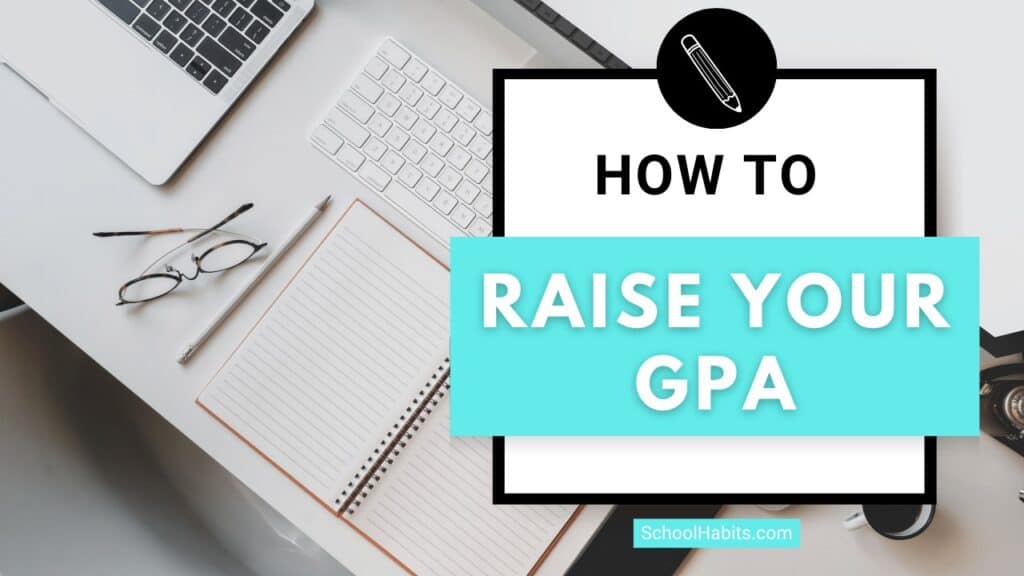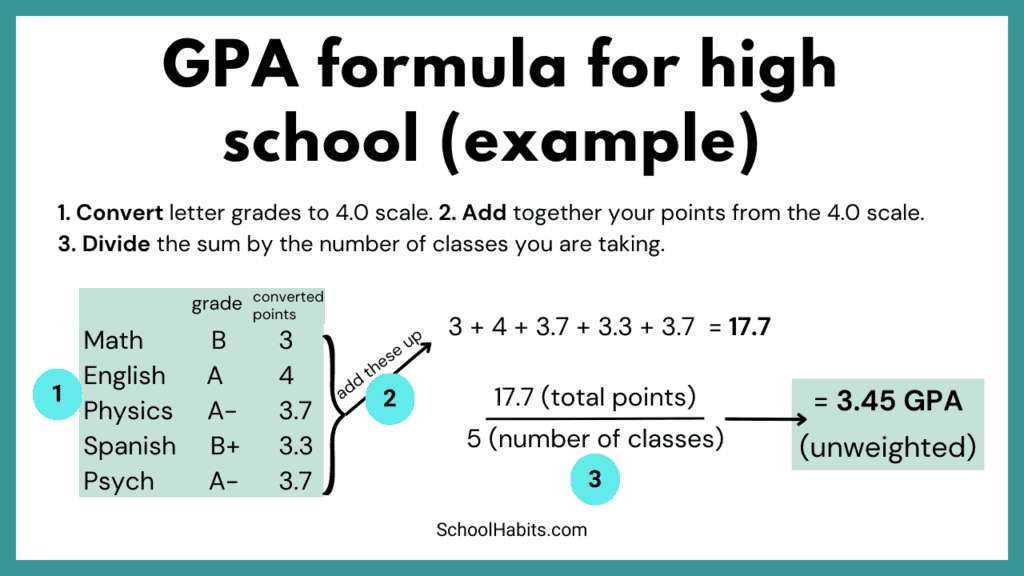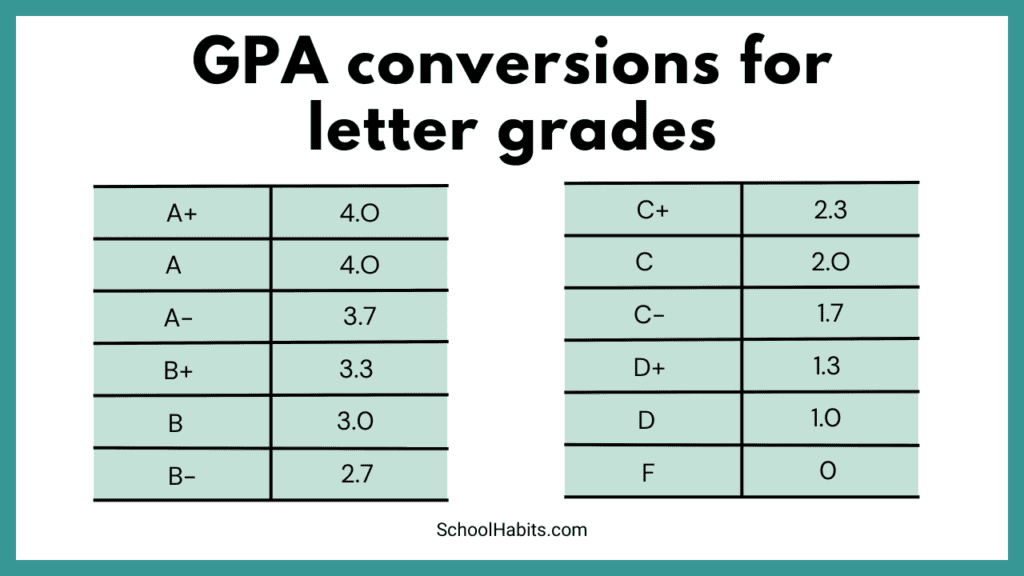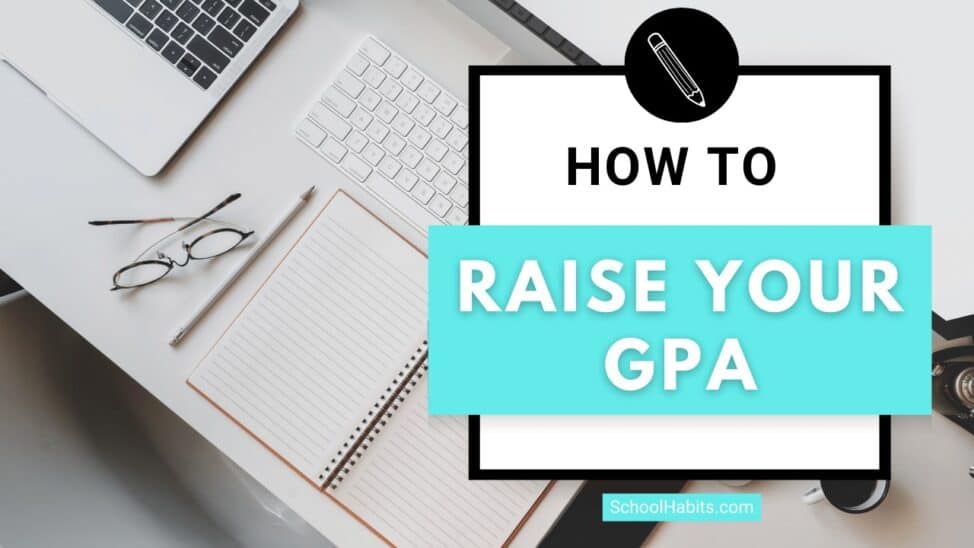
By Katie Azevedo, M.Ed.
This blog post covers everything you need to know about your GPA in college and high school, including how to raise your GPA, how to calculate your GPA, and why it even matters in the first place.
What is a GPA?
GPA stands for grade point average. This is a number that represents your cumulative average score (grade) across all your classes throughout high school and college.
Because your GPA depends on your grades, it can increase or decrease three or four times a year (depending if your school has trimesters or quarters).
Your GPA is finalized upon graduation.
What’s the difference between a 4.0 and a 5.0 GPA scale?
Most schools report a GPA on a scale of 0-4. Some schools report a GPA on a scale of 0-5. The 4-point GPA is also called an unweighted GPA, and it does not take into account how challenging your courses are. On the other hand, a 5-point GPA, also called a weighted GPA, factors in the difficulty level of your courses. (AP and honors courses have more “weight” and are worth more points.)
How to calculate your GPA
Your school calculates your GPA for you. If you can’t find it in your online academic portal, then you can ask your guidance counselor or advisor. However, it’s also possible to calculate your own GPA. If you’re in high school, you can use an online GPA calculator like this one. If you’re in college, use this college GPA calculator (because college GPAs are calculated differently).
If you want to calculate your own GPA, or you want to see how GPAs work on the back end, do this:
- Convert letter grades to the 4.0 scale (using the conversion chart).
- Add together your points from the 4.0 scale.
- Divide the sum by the number of classes you are taking.

To use the GPA formula above, you need to know how many points each letter grade is worth. Below is a chart of how many points you will earn based on your grade in a class. Note this is for an unweighted 4-point scale. For example, an A is worth 4 points, and a C is worth 2 points.

Why your GPA matters
Your GPA is a standardized way to measure your academic performance and predict future academic success. It matters for many reasons in high school and college.
Your high school GPA matters for several reasons:
- Having a certain GPA qualifies you for certain awards and recognition, including the National Honor Society, your school’s honor roll, and even scholarships.
- Many high school sports teams and afterschool clubs require students to maintain a certain GPA to participate.
- Having a solid GPA strengthens your college applications and increases your chances of being admitted to higher-level schools.
Your college GPA matters for several reasons:
- Having a certain GPA qualifies you for school-specific awards and recognition, including Latin Honors distinctions (cum laude, magna cum laude, summa cum laude).
- A certain GPA is required for some membership into Greek Life (fraternities and sororities).
- College sports and clubs require students to maintain a certain GPA to participate.
- A high GPA can strengthen your resume when you apply for jobs after college.
How to raise your GPA
You came to this blog post wondering how to raise your GPA. There are two primary ways to raise your GPA:
- Get better grades (for everybody)
- Take honors and AP classes (not for everybody)
The most direct way to improve your GPA in high school and college is to get better grades. I’m not saying that’s easy to do, but I’m saying that is the answer.
The following strategies will help you get better grades, which will, in turn, raise your GPA.
1. Attend all your classes
If you’re serious about raising your GPA, then the absolute least you can do is go to your classes. If you don’t go to class, you won’t learn the material, and if you don’t learn the material, you won’t get good grades on your assessments. Furthermore, you’ll score low points for class participation and classwork, directly affecting your grade. Remember from the formula above that your class grade (whether you get an A, B, or C in the class) is one of the main factors in your GPA.
2. Study better
Notice I didn’t say study more. I’m not about that (well, sometimes you have to study more … but you know what I mean). Studying better means that you’re using a combination of legitimate active recall study methods even though it’s painful to do so. Yes, I know passively flipping through your notes is easier, but say it with me now: that’s not studying.
Here are 12 critical study tips for college students, 11 study tips for people with ADHD, and 22 study tips for exams.
3. Get help
Getting good grades in hard classes is … hard. And sometimes that means that you have to get instruction from someone or somewhere beyond your teacher. Sure, you can stay after class with your teacher – and I would honestly try that first – but there are other things you can do too:
- get a tutor
- find a tutorial on YouTube
- ask a friend
- set up a study group
What’s not on the list above? Staying confused.
4. Take a break from extracurriculars
I don’t give this GPA-boosting tip lightly, because as a former extracurricular overachiever, I know the value of doing all the fun things after school. With that said, if you’re getting nervous about your GPA because you’re a junior or senior, then you might have to bite the bullet and sit a season out so that you can focus on your grades. This advice might not make me popular, but I’m, like, not here for that.
If you’re not convinced that cutting back on extracurricular activities is worth it, you should read this.
5. Get better at managing your time
I know “manage your time better” can be some of the world’s most annoying advice, especially to students who hear it all the time. But if we can put those feelings aside for a second, it’s such good advice.
The truth is that studying and learning take time. You don’t hear something in class or watch a video once and poof! You know it! Scientifically, that’s not how the learning process works. Just like it takes our bodies a certain amount of time to process food, heal a cut, or grow muscles, it also takes time to build the neural networks and mental schemas related to learning. You might WANT to pull an all-nighter and learn your material super fast … but again, that’s not how the process works.
Learning things well enough to get a good grade takes non-trivial time, and that’s why you need to be better at time management. The following time management strategies are essential.
- Get real about how much time you do and don’t have in a week by making your time visible. Do this by following my Google Calendar tutorial for students, or by taking out a piece of paper and making an hour-by-hour weekly schedule for an average week. Find what time blocks you have available for schoolwork and studying. Take this seriously.
- Do fewer things. See the tip above.
- Start being more disciplined on the weekends. Yes, students need the weekend to recover and rest, but if you’re on a GPA-raising mission, you’ve got to start using at least one weekend day for school stuff. Here are my tips for studying on the weekends.
- Plan your study sessions using spaced repetition. If you’re not already doing that, start now.
6. Take the right classes
This tip for how to raise your GPA isn’t exactly a Hail Mary strategy, but if you’re early enough in the game (a freshman, sophomore, or early junior), it can help. Taking honors and AP courses in high school can either hurt or help your GPA, depending on a) if your school weights your GPA based on course difficulty, and b) if you do well in the course.
Work with your guidance counselor to determine the best level classes for you, because although AP Calculus looks excellent on your transcript, a C- in that class doesn’t look good at all. In some cases, it’s better to get an A in the honors class and skip the AP status if you don’t think you can pull off a B or higher. Have that conversation with your advisors before registering for next year’s courses.
Final notes about raising your GPA
Again, the real answer to how to raise your GPA is to get better grades. Freshmen and sophomores have more time and flexibility to improve their GPAs because time is on your side. But if you’re a junior or senior, you only have a few semesters left to crank it up. My intention isn’t to cause panic: it’s to give you real information so that you can make good decisions. If you’re looking ways to end the year on a good note all around, then use these 5 tips for ending the school year strong.

